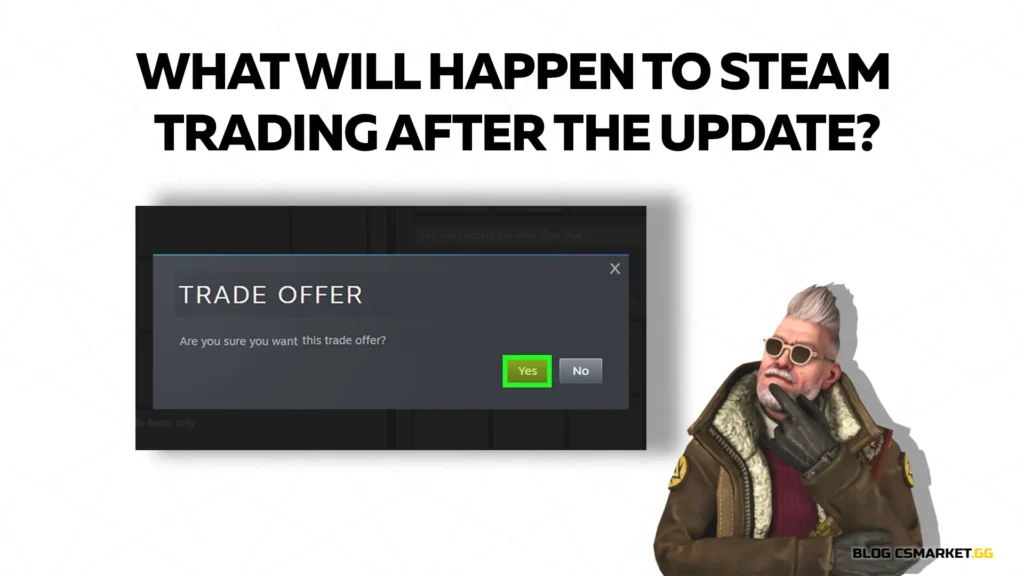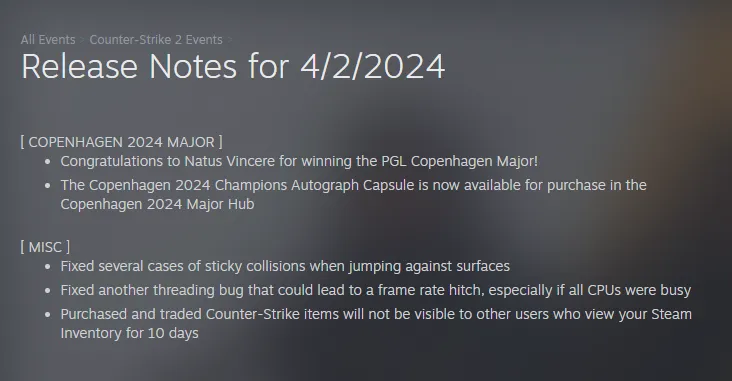What will happen to trading after this update?

On April 3, 2024, a small update was released for Counter-Strike 2, weighing only 191 MB. Many in the community, especially fans of Natus Vincere, were awaiting it due to the addition of new PGL Major Copenhagen 2024 winner capsules. In this update, VALVE indeed congratulated NAVI on their victory and released the champion capsule. But this wasn’t the only innovation from the developers. VALVE made some amendments related to the Steam inventory, which greatly alarmed many traders and active marketplace users. So, what happened, and is it all that scary? Let’s delve into it.
The most significant change was the 10-day block on new items that recently came into your possession. More precisely, they aren’t blocked, but simply hidden from other users. The blocking period remains unchanged and still amounts to 7 days.
Of course, VALVE didn’t explain anything to anyone, leaving everyone to figure it out on their own. No official statements or explanations of these actions from the guys in Seattle can be found. Several hours after the update, the following nuances were identified:
- Your friends can still see your items as soon as they appear in your inventory. However, this only works with users who have been on your friends list for a long time.
- Items obtained from cases or capsules (in other words, you are the rightful owner) can still be displayed in the inventory.
- Items obtained through trades are indeed not visible to other users.
- Containers used to store items have disappeared from inventories.
All of this works very unstably, so it’s possible that VALVE will release several more updates in the near future.

Is the new update a positive or a negative?
“Hope for the best, expect the worst” – these words seem to accompany every new innovation from the developers. The idea of protecting users’ accounts is very correct and positive, but this method defies any logic.
The first question: why exactly will items be hidden for 10 days? After all, you can’t do anything with them within 7 days of purchase/trade anyway. It turns out you just added 3 days when the user can manipulate the skin in any way, and no one will be able to track it.
It’s also unclear how this will protect people whose accounts have been stolen by scammers, or who have temporarily gained access to them? In three days, all skins can be re-registered without any problems, and you simply won’t know the fate of your items. For fair trading, this simply adds three extra days (the recipient is unlikely to agree to the deal since they won’t see the desired item in the inventory).
The change with the storage seems like a more reasonable solution. Players place items there themselves, and if they need to hide a valuable skin from their inventory, they now have that option.
What will happen to trading after this update?
We hasten to reassure you – everything will be fine. Most major players have already adapted to the new rules and are operating as usual. API keys are used to identify items, so it’s still possible to track which account the desired item is on. There are rumors that eventually the API key may be removed from the game, but automated bots on websites can manually update information about items.
Yes, this will introduce some minor adjustments or delays. Perhaps items with trade locks will be sold at even greater discounts, which isn’t necessarily a bad thing. There’s also a chance that VALVE might actually kill peer-to-peer trades, and you’ll have to use various services as guarantors to ensure the cleanliness of the transaction.
Many believe that VALVE is trying to make changes in areas where everything was already working well for some reason. The company has a lot of questions regarding their in-game issues, which they have inexplicably ignored for years. New operations, anti-cheat measures, a stable tickrate system, and much more.
Fighting scammers is a very noble endeavor, but naive and trusting users won’t go anywhere. Additional loopholes can only worsen the situation and open up new avenues for fraudulent schemes. Currently, VALVE has many measures in place that help attentive people keep their items safe. Authentication via the mobile app, 7-day trade lock, wallet funds delay on Steam when selling items – all of this really works.
We’ll continue to monitor the situation, but the main answer to the question is already clear – trading is alive and will continue to thrive for a long time.